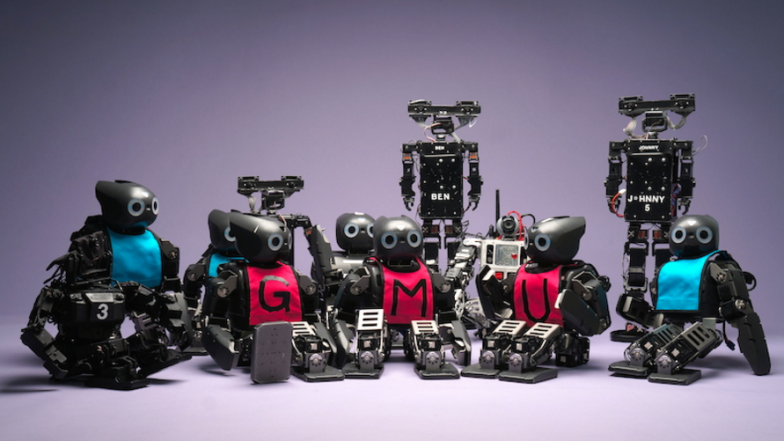Summary
At Mason Engineering, students teach robots how to move and sense their surroundings, and use teamwork to accomplish tasks.Information
Vogenau webpage GMU Autonomous Robotics Laboratory Robotics Research Robotics Club Motion and Shape Computing (MASC) Group
Educational Programs
Educational programs to improve robot intelligence and autonomy, especially in multi-agent systems, are one of the hallmarks of Volgenau. Students use computer science applications to program robots; electrical and computer engineering students use their skills to operate them; and mechanical engineers construct better and smarter robots.
Courses
Courses that students who are interested in robotics can take include:
- Introduction to Humanoid Robotics
- Introduction to Artificial Intelligence
- Optical Communications
- Autonomous Robotics
RoboPatriots Going for New Goals
Since 2008, our RoboPatriots have sent a team to the Robotics World Cup; an international challenge environment that propels advances in robotic controls, articulation, and program engineering by assigning simulated physical tasks from soccer.
More than just moving, kicking and dodging under remote control, the robot dubbed “Johnny 5” was the first robot in the history of the competition to “learn” soccer skills on the field in the midst of play.
This presence and flexibility of reasoning and learning in robotics is a frontier of artificial intelligence. Mason has staked our flag on the far horizon of this field with the establishment of the Autonomous Robotics Laboratory. There, our engineers design behaviors, programs and practical applications for future generations of task automation.
Where Teamwork Really Counts
George Mason University is thrilled to be an active supporter of FIRST robotics competitive teams and leagues throughout the area. The program invites young students to engage with computer science and engineering in a fun and imaginative team environment.

